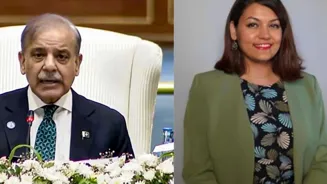India on Friday hit back at Pakistan after Prime Minister Shehbaz Sharif’s address to the United Nations General Assembly, accusing Islamabad of glorifying terrorism and spreading falsehoods on the world
stage.
Exercising India’s right of reply, Indian diplomat Petal Gahlot described Sharif’s remarks as “absurd theatrics” and said Pakistan had once again attempted to peddle a distorted narrative.
“This assembly witnessed absurd theatrics in the morning from the Prime Minister of Pakistan, who once again glorified terrorism that is so central to their foreign policy,” Gahlot said. “However, no degree of drama and no level of lies can conceal the facts.”
She pointed out that Pakistan had blocked accountability for a Pakistani-sponsored terror group accused of killing tourists in Jammu and Kashmir during an April 2025 attack, and recalled Islamabad’s history of sheltering global terrorists.
“Mr President, a country long steeped in the tradition of deploying and exporting terrorism has no shame in advancing the most ludicrous narratives to that end. Let us recall that it sheltered Osama bin Laden for a decade, even while pretending to partner in the war against terrorism,” she said, noting Pakistani ministers themselves had admitted to running terror camps.
“It should come as no surprise that once again this duplicity continues, this time at the level of its Prime Minister,” she added.
Gahlot also underscored India’s recent counter-terror operations. “A picture speaks a thousand words, and we saw many pictures of terrorists slain in Bahawalpur and Muridke terror complexes by Indian forces during Operation Sindoor. When senior Pakistani military and civilian officials publicly glorify and pay homage to such notorious terrorists, can there be any doubt about the proclivities of this regime?” she asked.
Aiming at Sharif’s account of the recent conflict with India, Gahlot described it as “bizarre.” “Till 9 May, Pakistan was threatening more attacks on India. But on 10 May, its military pleaded with us directly for a cessation to the fighting. The intervening event was the destruction caused to multiple Pakistani airbases by Indian forces. The pictures of that damage are, of course, publicly accessible. If destroyed runways and burnt-out hangars look like victory, as the Prime Minister claimed, Pakistan is welcome to enjoy it,” she said.
Gahlot stressed that Pakistan bore direct responsibility for a terrorist attack on innocent civilians in India. “We have exercised the right to defend our people against such actions and have brought the organisers and perpetrators to justice,” she said, adding that Islamabad must “immediately shut down all terrorist camps and hand over to us terrorists wanted in India” if it truly seeks peace.
Reiterating India’s longstanding position on bilateralism, Gahlot said, “India and Pakistan have long agreed that any outstanding issue between them will be addressed bilaterally. There is no room for any third party in that regard.”
She concluded with a firm warning on terrorism: “Where terrorism is concerned, we are making it clear that there will be no distinction between the terrorists and their sponsors. Both will be held accountable. Nor will we allow terrorism to be practised under the cover of nuclear blackmail. India will never bow to such threats. India’s message to the world is clear: there must be zero tolerance for terrorism.”
This comes after, while addressing a world grappling with intensifying conflicts and humanitarian crises, Prime Minister Sharif used the platform to accuse India of violating international law and launching an act of aggression in May.
He asserted that India had not positively responded to the offer of cooperation in investigating the Pahalgam incident, instead trying to “take political advantage of a humanitarian tragedy” by attacking civilian areas.
Sharif also made a dramatic, unverified claim, stating that the Pakistani Air Force, under the leadership of Air Chief Marshal Zaheer Ahmed Babar, had defeated the enemy, resulting in “seven Indian fighter jets reduced to rubble.”
He raised the issue of abeyance of the Indus Water Treaty, accusing India of defying the provisions of the treaty. “India’s unilateral and illegal attempt to hold the Indus Water Treaty in abeyance defies the provisions of the treaty itself as well as the norms of International law. Pakistan has made it abundantly clear that we will defend the inseparable right of our people on these waters. To us, any violation of the treaty represents an act of war,” Shehbaz Sharif said.
India suspended the treaty as a countermeasure to Pakistan’s cross-border terrorism following the April 22 Pahalgam attack that left 26 people dead.














